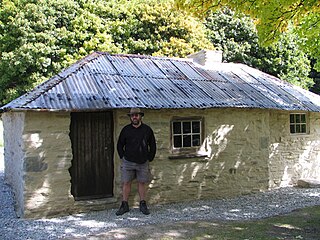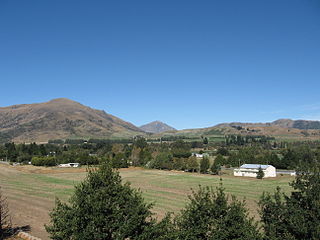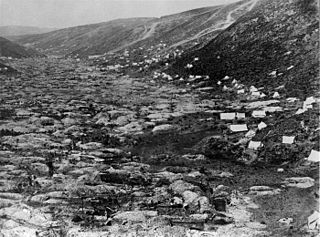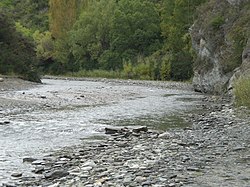Kaitangata is a town near the coast of South Otago, New Zealand, on the left bank of the Matau Branch of the Clutha River ten kilometres south east of Balclutha. The town is known to its residents simply as Kai.

The Otago gold rush was a gold rush that occurred during the 1860s in Central Otago, New Zealand. This was the country's biggest gold strike, and led to a rapid influx of foreign miners to the area – many of them veterans of other hunts for the precious metal in California and Victoria, Australia. The number of miners reached its maximum of 18,000 in February 1864.

Macetown is an historic gold mining settlement in the Otago region of the South Island of New Zealand. It is now uninhabited but has become a tourist attraction. Access to the town is via an unsealed road that heads up the steep-sided Arrow gorge. This can be traversed on foot or by mountain bike, horse or four-wheel-drive vehicles. The road crosses the Arrow River or its side creeks 22 times and is not suitable for two-wheel-drive cars. The start of the road is found in the Arrowtown car park.

Athol is a small town in Southland, New Zealand. It is located on State Highway 6, 55 km south of Queenstown, halfway between Lumsden and Kingston on the Southern Scenic Route. Farming has always been very important in the district, though in earlier times gold mining, centred on nearby Nokomai, was also significant. In recent decades tourist numbers have grown. The Mataura River is well known for the quality of its brown trout fishing, and the Around the Mountains Cycle Trail, opened in November 2014, has further boosted visitor figures.

The Waikaia River is a river in New Zealand, a tributary of the Mataura River. The name is probably a corruption of Wai-o-Whakaea.
The Gold Fields District electorate was a 19th-century parliamentary electorate in the Otago region, New Zealand. It was created in 1862, with the first elections in the following year, and it returned two members. It was one of eventually three special interest constituencies created to meet the needs of gold miners. All three of these electorates were abolished in 1870. A unique feature of the Gold Fields District was that it was superimposed over other electorates, and voting was open to those who had held a mining license for some time. As such, suffrage was more relaxed than elsewhere in New Zealand, as voting was otherwise tied to property ownership. Another feature unique to the gold mining electorates was that no electoral rolls were prepared, but voting could be done upon showing a complying miner's license.
The Gold Field Towns electorate was a 19th-century parliamentary electorate in the Otago region of New Zealand. It was the second gold mining electorate in Otago, one of three special interest constituencies created to meet the needs of gold miners; the third electorate was located on the West Coast. The Gold Field Towns electorate was in 1865, with the first elections in the following year, and it returned one member. All three of these special interest electorates were abolished in 1870. A unique feature of the Gold Field Towns electorate was that it covered ten separate towns within the area of the Gold Fields, which in turn was overlaid of a number of general electorates in the Otago area. Voting was open to those who had held a mining license for some time. As such, suffrage was more relaxed than elsewhere in New Zealand, as voting was otherwise tied to property ownership. Another feature unique to the gold mining electorates was that no electoral rolls were prepared, but voting could be done upon showing a complying miner's license.
William Baldwin, born John Baldwin was a 19th-century Member of Parliament in the Otago region of New Zealand.
Isaac Henry Manders was a New Zealand politician who was a Member of Parliament in the Otago region.

Choie Sew Hoy also known as Charles Sew Hoy was a New Zealand merchant, Chinese leader, gold-dredger and a New Zealand Business Hall of Fame laureate. He was born in the village of Sha Kong in the Poon Yu District of Guangdong Province, China in about 1838.

George Fairweather Moonlight was a New Zealand gold miner, farmer, storekeeper and hotel-keeper.
Queenstown Police Station is the largest police station in the Otago Lakes Central Area which is one of three policing areas in the Southern District of the New Zealand Police. The Otago Lakes Central Area headquarters has returned to Queenstown Police Station after a period at Alexandra Police Station. The area of responsibility covered by the Queenstown Police extends from Kingston in the south, to the Crown Range summit in the north, and from Glenorchy and its environs in the west, to the Roaring Meg power station in the Kawarau Gorge in the east.
Christopher Mace was an English-born cricketer. He played one first-class cricket match in Australia for Victoria in the 1861–62 season and one in New Zealand for Otago during the 1863–64 season, the first match played in New Zealand which has been given first-class status.

The blizzard and flood of 1863 was a series of consecutive natural disasters in Central Otago in New Zealand's South Island. In the early 1860s the area was in the midst of a gold rush. From July to August 1863 the gold fields suffered from a combination of floods, snowstorms, and blizzards that caused heavy loss of life among the gold miners. At least 40 died during the July rains and more than 11 in the August snows. Sources using the earliest reports of loss of life tend to greatly overstate the numbers who died.
William Henry Parker was an Australian-born cricketer. He played 25 first-class matches in New Zealand for Otago between the 1880–81 and 1896–97 seasons.
A by-election was held in the Gold Fields electorate on 29 May 1865. The by-election was won by Charles Edward Haughton, who defeated two other candidates.

James William Robertson was the first mayor of Queenstown, New Zealand.

William Warren was the fifth mayor of Queenstown Borough in New Zealand.

This is a list of mayors of Queenstown Borough in New Zealand. The mayor was the head of the Queenstown Borough Council. The borough existed from 1866 until 1986, when it merged with the Lake County to form Queenstown-Lakes District. During the 120 years of its existence, there were 21 mayors.
Henry Mace was a New Zealand cricketer. He played in one first-class match for Wellington in the 1877–78 season.











